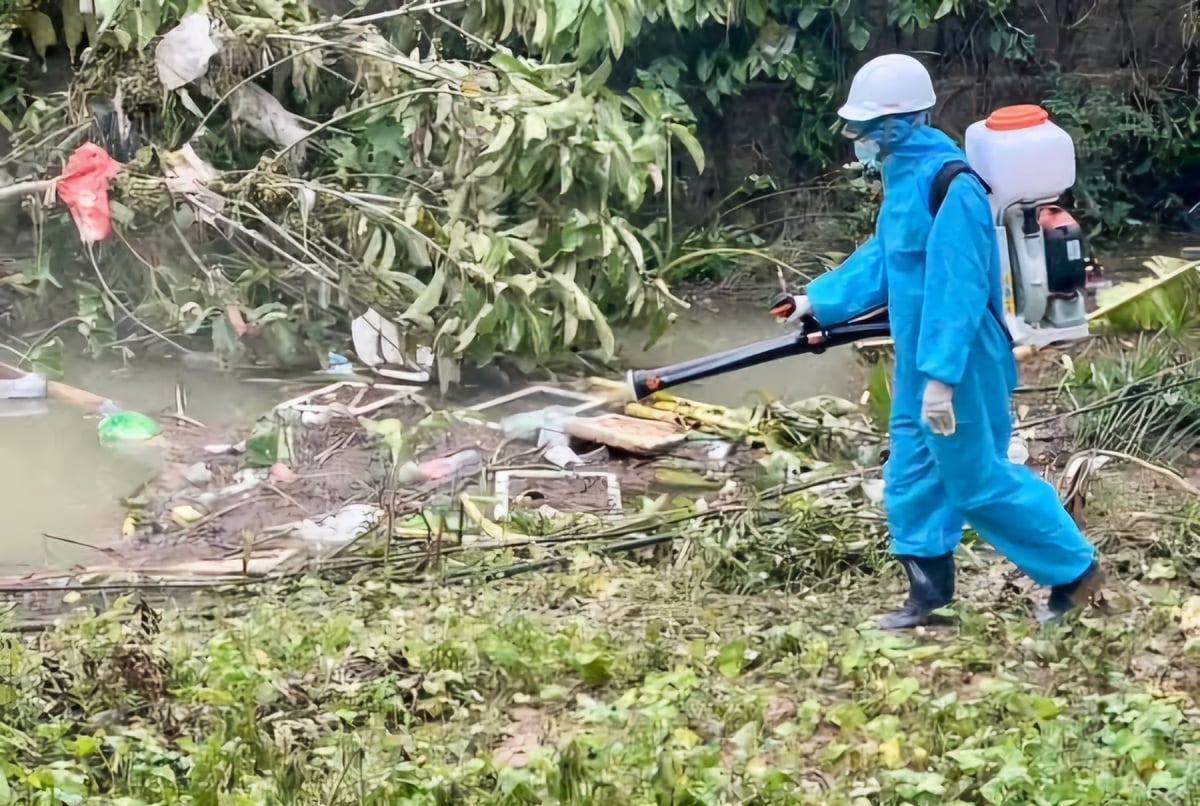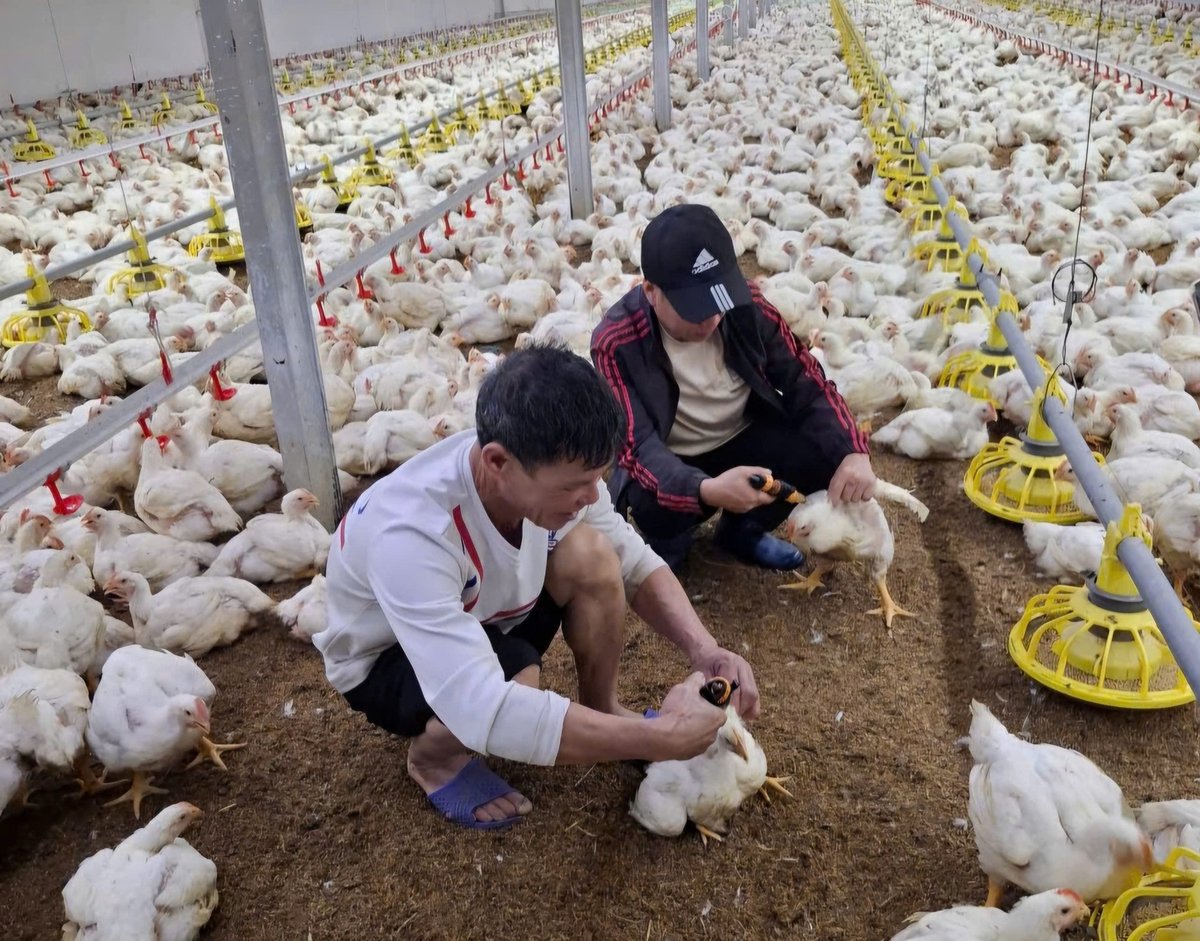November 27, 2025 | 14:55 GMT +7
November 27, 2025 | 14:55 GMT +7
Hotline: 0913.378.918
November 27, 2025 | 14:55 GMT +7
Hotline: 0913.378.918

Staff of Uong Bi Agricultural Technical Service Center spraying disinfectants to prevent disease. Photo: Vu Cuong.
Uong Bi city (Quang Ninh province) has just launched the first month of general cleaning, disinfection, and environmental detoxification in 2025 to eliminate pathogens, prevent the outbreak and spread of diseases, minimize economic losses, and ensure disease safety and food safety. The period is from March 1 to March 31, 2025.
According to the plan, wards and communes in the area will establish working teams to organize general cleaning and disinfectant spraying in household livestock barns, grazing fields, trading sites for live animals and animal products, and areas for collecting and treating animal waste.
Disinfection spraying is carried out after completing mechanical cleaning. Concentrated livestock farms, poultry and waterfowl hatcheries are responsible for proactively cleaning, disinfecting and sterilizing livestock areas under the supervision of local veterinary staff.
According to Nguyen Duy Toan, Director of Uong Bi City Agricultural Technical Service Center, the city will promote information dissemination and raise awareness for the livestock owners and the community about the risk and harm of epidemics on cattle and poultry. Farmers provide guidance on applying disease prevention measures and proactively handling the situation when there are signs of a newly appeared epidemic. Cases of hiding epidemics and slow reporting of disease spread will result in strict punishment.
In addition to general hygiene, disinfection, and environmental detox, Uong Bi city also strengthened measures to prevent avian influenza in the area. "The wards and communes need to allocate appropriate funding and synchronously deploy disease prevention measures according to the plan of the city's agricultural sector," said Director Nguyen Duy Toan.

Workers at the chicken farm of Doan Van Chien (Thuong Yen Cong commune) focused on vaccinating to prevent disease for poultry. Photo: Vu Cuong.
The weather is now in the changing season period, creating favorable conditions for avian influenza virus to develop and spread. Along with that, the number of herds increased after the Lunar New Year, while a majority of livestocks have not been fully vaccinated, increasing the risk of disease outbreaks in the localities.
Uong Bi City People's Committee requests the People's Committees of communes and wards to drastically implement measures to proactively prevent avian influenza, thereby protecting livestock and public health.
it is particularly essential that local authorities well-perform the communication and guide the people, especially farmers who actively monitor poultry infected or suspected of catching the disease to promptly detect, report to the authorities and veterinary agencies. Farmers must absolutely not trade, slaughter, consume sick poultry or throwing poultry and untreated waste into the environment. All farming households should strictly implement disease prevention measures and make disease reports as prescribed.
Nguyen Nang Nam, Chairman of the People's Committee of Thuong Yen Cong commune said, "The locality has many households raising cattle and poultry, including two large-scale chicken farming facilities. In order to enhance the prevention of avian influenza epidemics in the area, officials of the Agricultural Technical Service Center recommend that livestock households clean the farm daily, disinfect with chemicals and lime powder in poultry farming areas, and fully inject disease vaccines for poultry."
Local authorities also suggest that people do not use poultry and poultry products of unknown origin, only consume poultry after it is thoroughly cooked. Farmers must not eat blood pudding or participate in illegal trading and transportation of poultry and poultry products.
Communes in Uong Bi city are currently reviewing the total poultry herd and organizing the vaccination for poultry to make sure that they meet the goal of over 80% of the existing herd before April 30, 2025. Local authorities will build and arrange resources to implement the 2025 cattle and poultry prevention and control plan.
"Livestock households make livestock declarations as prescribed. For farmers who do not make the declaration when the disease occurs, they will not be supported as prescribed," said Nguyen Duy Toan, Director of the Uong Bi City Agricultural Technical Service Center.
The prevention of hunger and cold for cattle and poultry in Quang Ninh is also being well-implemented thanks to the drastic involvement of the government and the people. This is an important factor to minimize damage and protect the livelihood of thousands of livestock households.
In the context of increasingly complex climate change, in order to ensure sustainable development of livestock, measures to prevent hunger for livestock should continue to be carried out more strongly, from supporting the construction of cages and feed inventory to disease monitoring and awareness raising for people.
Translated by Samuel Pham

(VAN) On the morning of November 27 in Beijing, Minister Tran Duc Thang and the Deputy Commissioner General of the General Administration of Customs of China signed a protocol on fresh jackfruit exports.

(VAN) As floodwaters recede, a vast network of irrigation works across eastern Gia Lai is emerging in a state of severe disrepair, with extensive damage demanding urgent restoration ahead of the 2025-2026 winter-spring cropping season.

(VAN) The conference reviewing three years of implementing Decision 911 identified the need to prioritize improving marine environmental quality and promoting sustainable fisheries development.

(VAN) Le Hoai Trung, Member of the Communist Party of Viet Nam Central Committee and Minister of Foreign Affairs, held talks with Vi Thao, Chairman of the Guangxi Zhuang Autonomous Region (China) this week.

(VAN) The Mekong River Commission adopts the 2026 - 2030 Strategic Plan with a people-centered approach.
/2025/11/26/1720-1-200855_132.jpg)
(VAN) Viet Nam and Japan have many conditions to expand cooperation on climate change adaptation, particularly in disaster risk management based on advanced technologies.

(VAN) The strong development of digital technology and artificial intelligence is opening up opportunities to transform science and technology into a 'Magic eye' for disaster forecasting and early warning.